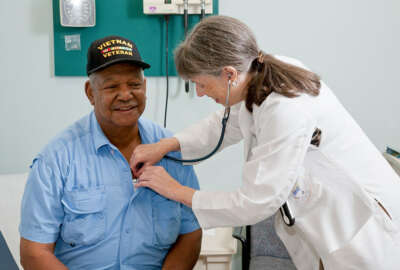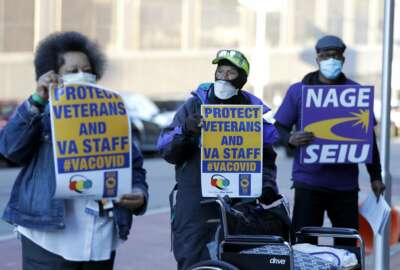

Veterans Affairs Secretary Robert Wilkie said VA's supply of masks and personal protective equipment is stronger and at a more comfortable place today than it w...
Best listening experience is on Chrome, Firefox or Safari. Subscribe to Federal Drive’s daily audio interviews on Apple Podcasts or PodcastOne.
Though the austerity measures it put in place on personal protective equipment at the height of the coronavirus pandemic were less than ideal, the Department of Veterans Affairs on Thursday assured Congress the organization is better stocked, staffed and ready for whatever comes next.
To date the department has diagnosed around 11,500 veterans with coronavirus, but 9,000 have recovered, VA Secretary Robert Wilkie said. Today, VA facilities are treating 1,500 veterans with the virus.
VA’s public coronavirus data tool shows 118 health employees have active coronavirus cases. At least 31 VA employees have died due to complications from the virus.
In the busiest days of the pandemic, VA’s supply of personal protective equipment was limited.
“We were not working in optimal conditions,” Wilkie told the House Appropriations Subcommittee on Military Construction and Veterans Affairs. “We had to compensate for that. Thank the lord, we’ve had a very, very low infection rate among our employees.”
The Veterans Health Administration imposed austerity measures for PPE in mid-April, when employees not directly working with coronavirus patients received one mask a week.
Since then, PPE usage among VA medical professionals has grown as the department has restocked its supplies, Wilkie said.
“I would also argue the entire nation has been learning this on the fly,” he said of VA’s emergency mask policies. “For the first time in the history of VA we did have to share resources with the city of New York and the state of New York and the city of Los Angeles. We followed [Centers for Disease Control and Prevention] guidelines. We followed them to the letter. We followed the same guidelines that you would find at Georgetown Medical Center or New York University. The results have shown that we have done an excellent job, better than any health care system in the country, in keeping these numbers as low as we have.”
The department will change its austerity measures when facilities begin to resume normal operations. VHA has been marshaling and stocking up on supplies ahead of another potential wave of infections, Wilkie said.
But when pressed for more details on VA’s current mask policies, the department was less specific. Rep. Debbie Wasserman Schultz (D-Fla.), the subcommittee’s chairman, said VA employees have told her they’re reusing masks or laying them out in the sun after one use.
“We are at universal masking right now,” said Jennifer MacDonald, chief consultant to the deputy VA undersecretary for health.
Employees who need N95 masks have them, while other VA health professionals are given one mask a day, she added.
As of Wednesday, VHA had a 39-day supply of gloves, 333-day supply of face shields, a 267-day supply of N95 masks, 244-day supply of generic masks and a 55-day supply of gowns, according to Wasserman Schultz.
Congress also pressed the department for details of its coronavirus testing policies for the VA workforce.
VA employees, including those who are symptomatic or simply want a test, have access to coronavirus screening, MacDonald said.
Yet some subcommittee members said they’ve heard otherwise from their constituents. Rep. Matt Cartwright (D-Pa.) said employees at the VA facility in Wilkes Barre, Pennsylvania, had been told to seek coronavirus testing elsewhere.
Like nearly every aspect of the ongoing health crisis, the pandemic will force some permanent changes with VA operations, which Wilkie said employees have embraced.
Challenges with the medical supply chain, for example, will transform VA systems for the better, he said.
“At the end I believe our people have turned VA into a learning organization, that was able to turn on a dime in this crisis, and transform itself from an institution that many of us have known and some of us have looked askance at for many years,” Wilkie said. “I can’t thank them enough for their agility. I can’t thank them enough for putting themselves in harm’s way to serve their fellow Americans.”
Many of the changes VA made during the pandemic to its onboarding and hiring processes will continue, Wilkie said. He said he may ask Congress for further legislative changes to their hiring procedures.
Telehealth services, which have grown significantly during the pandemic, will continue well after the crisis is over, Wilkie said. In April, VA conducted 1.2 million mental health appointments by video and phone.
“We have stressed the system, and I don’t believe we’re going to go back,” he said of VA’s telehealth services.
Other changes that have come from the pandemic, however, will not continue. The department canceled in-person compensation and pension exams in early April for veterans seeking disability benefits.
Though VA has been able to process some remotely, a backlog of 114,000 claims has developed since last month, said Paul Lawrence, undersecretary for benefits.
“We’re partially awarding claims, and we’re awarding some of the claims we have,” he said. “But this is a big deal. We’re working with the vendors to get ready to reopen.”
VA announced Thursday afternoon in-person exams at some facilities would resume in the next few weeks. The department’s contractors will begin contacting veterans with pending compensation and pension claims to schedule new appointments.
Permitting VA doctors to conduct these exams across state lines and allowing nurse practitioners to handle these exams as well would boost the department’s capacity, Lawrence said.
“In November, the backlog was 64,000,” he said. “We know how to drive it down. We’re not proud of this. Our team is embarrassed. but we want to open it up, get the C&P exams and get back to that very low number.”
Copyright © 2024 Federal News Network. All rights reserved. This website is not intended for users located within the European Economic Area.
Nicole Ogrysko is a reporter for Federal News Network focusing on the federal workforce and federal pay and benefits.
Follow @nogryskoWFED


